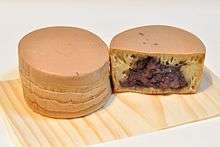Imagawayaki
Imagawayaki (今川焼き) is a Japanese dessert often found at Japanese festivals as well as outside Japan. It is made of batter in a special pan (similar to a waffle iron but without the honeycomb pattern), and filled with sweet azuki bean paste, although it is becoming increasingly popular to use a wider variety of fillings such as vanilla custard, different fruit custards and preserves, curry, different meat and vegetable fillings, potato and mayonnaise.[1][2] Imagawayaki are similar to Dorayaki, but the latter are two separate pancakes sandwiched around the filling after cooking, and are often served cold.
 | |
| Course | Snack |
|---|---|
| Place of origin | Japan |
| Region or state | Japanese-speaking areas, Taiwan |
| Main ingredients | Batter, sweet azuki bean paste |
Imagawayaki began to be sold near the Kanda Imagawabashi bridge during An'ei years (1772–1781) in the Edo period. The name of Imagawayaki originates from this time.
Various names
Imagawayaki has various names by areas and eras.
- Ōban-yaki (大判焼き) — is major in Kansai region.
- Kaiten-yaki (回転焼き) or Kaiten manjū (回転饅頭) — is major in Kansai and Kyūshū region.
- Nijū-yaki (二重焼き)
- Koban-yaki (小判焼き)
- Gishi-yaki (義士焼き)
- Tomoe-yaki (巴焼き)
- Taiko-yaki (太鼓焼き) or Taiko manjū (太鼓饅頭)
- Bunka-yaki (文化焼き)
- Taishō-yaki (大正焼き)
- Jiyū-yaki (自由焼き)
- Fūfu manjū (夫婦饅頭) or Fū man (フーマン)
- Oyaki (おやき) — is in some of Aomori Prefecture and Hokkaidō, and different from "oyaki" in Nagano Prefecture.
By the store or the company
- Gozasōrō (御座候) — is a product name of Gozasōrō Inc which was established in 1950 in Himeji. It means "thank you for the purchase" in an archaic style.[3]
- Higiri-yaki (ひぎりやき) — is a product name of Sawai Honpo Inc in Ehime. It originates in Higiri jizō near the Matsuyama Station.[4]
- Jiman'yaki (自慢焼き) — is the name used by the Fuji Ice shop in Nagano.
Historical and inactive
- Fukkō-yaki (復興焼き, "revival-yaki") — The song on the occasion of the revival after the Great Kantō earthquake in 1923, is mentioned that imagawayaki was renamed fukkōyaki.[5]
Taiwan
In Taiwan they are commonly called "red bean (i.e. azuki) cake" (Chinese: 紅豆餅; pinyin: hóngdòu bǐng). In the greater Taipei area they are referred to as "car wheel cake" (Chinese: 車輪餅; pinyin: chēlún bǐng). However some of the older generation may directly use the Japanese term taiko manjū (太鼓饅頭).
Philippines
The Filipino counterpart, locally known as Japanese Cake, is similar to imagawayaki but of a smaller serving size and is usually filled with cheese slices. This inexpensive snack is commonly found sold on special tricycle carts that have a built-in custom-made circular cooking mold. Other fillings are also available with sweet (strawberry, chocolate) and savory (ham and cheese) fillings. [6]
See also
- Egg waffle
- Ji dan gao (雞蛋糕) - egg sponge cake
- Taiyaki
- Wagashi
References
- Different varieties of Imagawayaki, tasting description
- Nichirei Custard Cream Imagawayaki
- Kobe Shimbun, June 28th, 2003.
- Ehime Shimbun, March 5th, 2005.
- Satsuki Soeda and Hakurui Shibuya, "Fukkou bushi" (復興節), 1923. JASRAC 074-0605-3.
- http://www.panlasangpinoyrecipes.com/japanese-cake-pinoy-style-recipe/
External links
- (in Japanese) "Between Kaiten'yaki, Ōban'yaki and Imagawayaki" by Tsutomu Kushima. He is an investigator of the popular culture of Shōwa period.
- (in Japanese) Nijyūyaki Jōhō
- (in Japanese) Gozasōrō Inc.